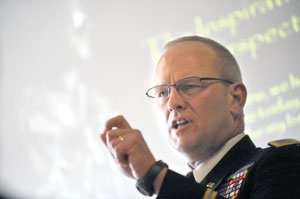In his Aug. 7 essay “Pull together for veterans,” distributed by Hearst Wires, U.S. Army Col. David Sutherland said veterans do not receive the services they need.
Sutherland, a Toledo native and Bowling Green State University graduate, said there is an “overabundance of veterans groups” with “redundant efforts.”
“Each [veteran] has unique capabilities and may have unique needs,” Sutherland said. “Yet in many cases … you see cookie-cutter solutions as opposed to individual services.”
Sutherland said it’s common that veterans come home to families and communities looking for meaningful connections but are overwhelmed trying to find them.
“It’s confusing to the point where they may not ask for assistance, because they don’t know where to go,” Sutherland said.
Contrary to popular belief, Sutherland said veterans do not come home to big government organizations providing help; solutions are mainly found on the local level. Such efforts should be consolidated, he said.
Sutherland said veterans need “wrap-around services” such as education, access to health care and employment opportunities.
“Every need and opportunity for us can be looked at in a continuum, a continuum that includes our families,” Sutherland said.
In response to these needs, Sutherland and U.S. Navy Lt. Cmdr. Kim Mitchell founded the Dixon Center for Military and Veterans Community Services in July 2012.
It serves as a partnership with Easter Seals, which has been providing services to the military and veteran communities since 1945. Together, the organizations establish a network of service providers and local leaders to better the military, veterans and the families of veterans. The center is working nationwide but the physical headquarters is located in Washington, D.C.
The center is named in honor of Staff Sgt. Donnie Dixon, who was in charge of Sutherland’s security in Iraq. He was killed Sept. 29, 2007, during a firefight in Balour, Iraq.
“Besides the fact that Dixon died while ensuring my security, he’s also representative of most of the service members that have fought in Iraq and Afghanistan,” Sutherland said. “He was a noncommissioned officer, he was a husband, he was a father, he was on his second deployment and he was a volunteer.”
Sutherland joined the military Sept. 23, 1983. He commanded the U.S. combat brigade in Diyala Province, Iraq, from 2006-07 and served as the special assistant to the chairman of the Joint Chiefs of Staff from 2009-12.
Sutherland retired in 2012 and transitioned from one “life-calling career to another,” he said. He now serves as a vocal advocate and mentor for service members, veterans, military families and the families of the fallen.
“The bonds that exist on the battlefield are unlike any bonds that you can imagine, and when we come home those bonds are ripped apart,” he said.
Sutherland said he still talks to the men he served with and people contact him for advice every day. It is in their honor that he advocates.
“Veterans are committing suicide at a rate of 22 a day; one in five female veterans is homeless; the unemployment rate for Iraq and Afghanistan veterans right now is 10 percent and over 20 percent for 18- through 28-year-old veterans,” Sutherland said. “Unemployment, homelessness and suicide should never be used in the same sentence as veterans and military families.”
Sutherland said he came back from Iraq feeling like he didn’t fit in.
“I have a very strong family and a very strong support group and I was able to get the resources and support I needed because I was still serving in the military,” he said.
He said veterans face dark times after homecomings. To help them cope, Sutherland said he encourages veterans to talk and asks them where they see themselves in five years and how they plan to achieve that goal.
Sutherland has interacted with leaders such as former director of the CIA David Petraeus. He also attended a state dinner for Iraqi war veterans at the White House that President Obama attended.
In February, Sutherland was honored with the Daily Point of Light Award, an award established by former President George H.W. Bush from the Points of Light Foundation. It “honors individuals and groups creating meaningful change in communities across America,” according to a news release.
Sutherland was inducted into BGSU’s ROTC program’s hall of fame.
“That was a watershed moment,” he said. “If you go to Bowling Green, you’re inextricably linked to that institution for the rest of your life.”
At the end of his essay, Sutherland argues that time should not be wasted; the time to provide such services to veterans is now. The U.S. combat mission in Afghanistan officially ends in 16 months and the more than 2 million Americans who were deployed will be coming home.
“We forget about the war; American people cannot forget about the veterans and the military families,” he said.
The essay may be read in full at www.sutherlandpartnership.com.























